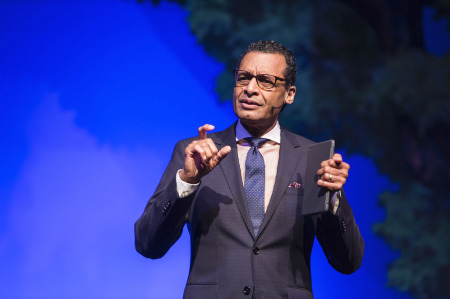Megachurch pastor AR Bernard doesn’t think the white Church should be desegregated

A.R. Bernard, the pastor and founder of New York City's largest evangelical congregation, says he doesn’t believe that there should be an intentional “movement to desegregate the white Church.”
Bernard, who heads the Christian Cultural Center in Brooklyn, spoke during a Martin Luther King Jr. Day webinar on Monday hosted by the American Bible Society. The webinar is titled “Repairing the Breach: Biblical reflections on the legacy of Dr. Martin Luther King Jr. and how to repair racial divides.”
During a discussion about whether multicultural churches are the answer to the racial divide seen in the American Church, the 67-year-old pastor said that pushing white churches to desegregate wouldn’t be “legitimate.”
“I don’t believe that there should be a movement to desegregate the white Church. I don’t think that that’s legitimate. I don’t think that that’s real,” he said. “I do think that we need to reconsider the curriculum of the Church and how that curriculum could reinforce segregation or open us up to the beauty of the diversity that exists in the body of Christ because all ministry is contextual.”
Bernard expressed his belief that there shouldn’t be any “guilt or shame because a church is predominantly one color.”
“The curriculum of the church, what is the preaching? What is the teaching? What are people being exposed to beyond the four walls?” he asked, pointing to the things that he thinks are important for racial healing.
Ed Stetzer, a professor and dean at Wheaton College who also serves as executive director of the college’s Billy Graham Center, was also a participant in the webinar panel moderated by ABS’ Nicole Martin. He agreed that church diversity should be contextual.
“It is a good thing when the diversity of the church matches the diversity of the community, even maybe exceeds the diversity of the community,” Stetzer said.
“I preached Sunday in New York City at Calvary Baptist Church and there was no majority ethnicity, race or background in that room. But that’s New York City. We also might recognize somebody in Montana might have a different experience.”
Recalling the social climate during the time of King’s ministry in the 1960s, Bernard said it was also a time of upheaval and significant social change. It was also a time when the relationship between the Church and the culture was also in question, he said.
“We are 100 years removed from Emancipation Proclamation, which led to Reconstruction, which was a 12-year period of very exciting growth and development and hope in the black community in America, but only to have it disrupted by segregation and Jim Crow,” Bernard recalled.
“So it began a journey of not just the free, but establishing freedom with equality in America among people of color. And I think that the 1960s, with all of its various revolutions that were taking place, really brought it to a culmination. But the backdrop of that is the forced change within the Church.”
The pastor also spoke about how famed evangelist Billy Graham initially struggled to attract Christians to a massive crusade in New York City in 1957 before enlisting the help of King and other black preachers.
“And of course as reported by the Graham Library, 2.4 million persons attended the meetings and some 61,000 decisions were made for Christ," the pastor explained.
Bernard said that a few days into the crusade, Graham saw that his audiences were overwhelmingly white and enlisted the help of Howard Jones, a pastor of the Christian Missionary Alliance Church in Cleveland. Graham ultimately decided to invite King to his crusade in hopes of attracting African American attendees.
“Dr. Graham, to his credit, and this is what I love and appreciate about him, he made a decision to do something that was considered radical at the time. So in July of that year — the 18th of July in ‘57 — Dr. Graham invited Dr. Martin Luther King to come to Madison Square Garden to take the stage and give a public prayer,” Bernard said.
“And I think the way he introduced him was critical. He said a great social revolution is taking place in the United States and Dr. King is one of the leaders and we appreciate the fact that he took the time out of his busy schedule to be with us, to share with us in the service tonight. And for Dr. Graham, that was major. For those who were there and those who respected Dr. Graham’s stature in the evangelical church, it was quite a departure from what was typical.”
Critics like Jerry Falwell Sr., said Bernard, went after King in 1964 by suggesting he was a communist and arguing that preachers shouldn’t be involved in politics. A decade later, however, Falwell would become active politically with his leadership in the Christian conservative Moral Majority movement.
“The '60s represented a critical shift in the direction of the Church and the direction of Christianity in the United States because the black Church was already involved and actively engaged in the civil rights movement,” Bernard said
It was also noted by the panelists that during the time of his most significant ministry work, King was not celebrated.
“Dr. King was not celebrated and popular even in the black community because as a young black man growing up in Bedford Stuyvesant Brooklyn, the choice was Dr. King and Malcolm X. And for the most part, we chose Malcolm because we felt that Dr. King, many of us did not understand the power of non-violence and his appeal to the conscience of American society,” Bernard recalled. “We were at a place where we felt that the system had to be changed and it had to be changed radically. There was no time for discussion.”





















